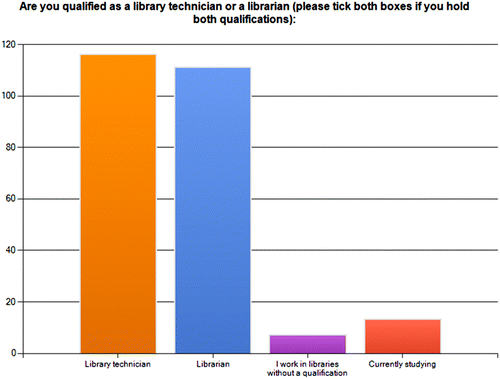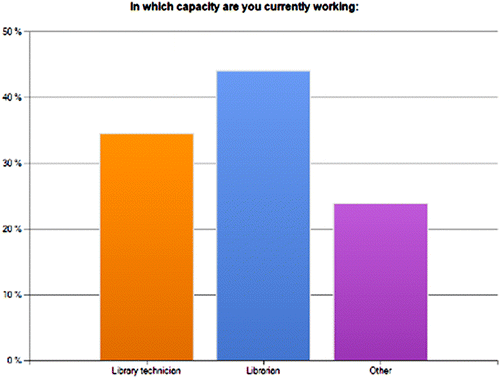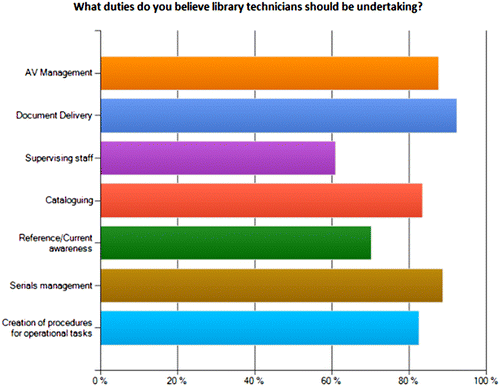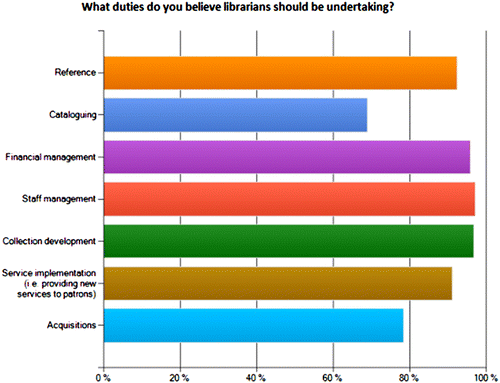Abstract
Due to differing perspectives or role boundaries, the working relationships between librarians and technicians have often been fraught with tension and difficulty. If this divide results in a negative team dynamic in the workplace, it can have an impact on the service of the library or information agency and in some cases, its budget. This article disseminates the results of a survey of over 200 library workers conducted by the author in January 2013 on the subject of working relationships. Librarians, library technicians and other support staff across all sectors participated in the survey. The article discusses the tasks that librarians and library technicians often undertake, the differences between the two roles and any areas of role overlap, and areas of tension or difficulty in working relationships. The article also examines some of the reasons why library technicians upgrade their qualifications, and if holding dual (librarian and library technician) credentials has changed their relationships with other library technicians, and introduces ideas to improve relationships, including measures that the industry can take to forge a greater understanding between librarians and library technicians. The potential outcomes can ensure that libraries and information services retain staff.
Implications for best practice
Understanding and resolving the tension between professionals has a positive effect on workplace morale and staff retention levels.
Addressing role overlap in libraries leads to greater staff productivity and improved teamwork.
A greater knowledge of what each professional is capable of is required by employers when recruiting staff.
Library technicians who have upgraded their skills to become librarians often have more positive working relationships with other technicians. Barriers to library technicians upgrading their qualifications should be addressed by the industry.
A number of different measures can be implemented by individuals, employers and the industry generally to improve workplace relationships between librarians and library technicians.
Introduction
Workplace relationships have the ability to significantly enhance or diminish workplace morale and culture. Since the creation of the library technician role, there has been an interesting dynamic at play between librarians and library technicians. Library technicians become qualified through completing a TAFE diploma course; librarians undertake a university degree as an undergraduate or postgraduate. This article examines working relationships between the two groups, examining the types of tasks each professional undertakes, areas of role overlap, and if tension is present between the two groups. This article also considers why some library technicians have chosen to upgrade their qualifications and examines potential barriers to library technicians becoming librarians. There are many things that individuals, workplaces and the industry can do to improve working relationships, and some of these measures are considered in this article.
At the start of 2013 I created a survey entitled ‘Working relationships between library technicians and librarians’. The survey questions are given in the appendix. I asked library professionals (librarians, library technicians and others) across all sectors to answer questions and provide information about their experiences. This was accomplished by emailing a number of email lists with a link for the survey; I also asked some of my own professional contacts individually via email if they would participate. In total 218 professionals responded and I received a number of meaningful comments and suggestions, some of which I have incorporated into this article. I provided an overview of this research at the New Librarian's Symposium held 9–11 February 2013 at Queensland University of Technology, Brisbane. The session was entitled ‘Know thy technician: examining working relationships between librarians and library technicians’, as the subject is of value to both groups.
Basic survey statistics
Information about each respondent's qualification and position title was requested (see Figure ). Of the survey respondents 80% held both library technician and librarian qualifications. Those surveyed were not asked to list the library sector they worked in, but judging from respondents' comments many worked in academic, special or public libraries.
When asked about what capacity each professional works in, over 22% of respondents indicated that their official position title was not librarian or library technician (see Figure ). Other position titles included library officer/assistant (6.2%), library/branch manager (2.4%) and lecturer/teacher (2.4%). Two individuals stated that they worked in the related field of information management (records), but still had some involvement with libraries. Seven others indicated that they were either retired, a volunteer, or looking for work in libraries.
Library technician tasks
As libraries are changing, the nature of the work that each professional undertakes is also changing. As Marian Fragola (Citation2009, 17) states, ‘In today's libraries … paraprofessionals, library technicians, or support staff, perform tasks that were the sole purview of professional librarians in the not-so-distant past’. The number of professionals working in a library also makes a difference: as a survey respondent commented, ‘It depends on the size of the library, but in my case, my role overlaps quite significantly with that of the librarian as there are only two of us’.
In the survey a number of ‘typical’ library technician tasks were listed and survey respondents were asked to comment on which tasks they most identified with the library technician role. The tasks listed were not sector specific (see Figure ).
Tasks most often carried out by library technicians were document delivery, serials management, and audio visual management. Tasks least often associated with library technicians were staff supervision, and reference/current awareness. Respondents indicated other tasks: ‘Library system management, collecting stats from system, delivery of e-Services’; ‘Processing new resources; customer service; collection maintenance; acquisition suggestions’.
Acquisitions were mentioned by 36% of respondents as being a task that library technicians could undertake: – ‘Acquisitions as well… if the [library technician] has experience and knowledge of the library they work in and the services it provides, they should be able to take a share, if not responsibility, for acquisitions’ – although a third of the respondents who suggested acquisitions as a task for library technicians indicated that they thought the process should be closely supervised by a librarian.
Other respondents provided an overview of library technician tasks:
All above are duties LT are trained to undertake, developing expertise in line with job experience. Supervision of trainees and clerical staff is often undertaken though is often not reflected in pay rates.
All library duties not related to management.
Other comments on the role of library technicians in libraries indicated that library technicians are mainly focused on operational tasks, but that they are necessary to the effective running of libraries:
The role of library technicians is necessary. They are different from other library supporting and front-line staff because they have technical background and experience. They can also assist the system librarian to carry out the technical projects.
Library technicians are capable of all tasks in a library… though management is better left to those who have librarian qualifications and have covered that subject whilst studying
I believe there is a great role for lib techs to work at a higher technical/admin level. Unfortunately my limit(ed) experience of working with 4 individual lib techs during the last 10 years, 3 out of 4 had gone back to train in middle age and were not flexible thinkers. In this century flexible thinking is mandatory as we manage reduced staffing and rapid changes in technology.
I see the technician role as operational and process based. That said, there should be opportunities for refining and improving on processes rather than ‘just following orders’.
Librarian tasks
If the role of library technicians is changing, what does that mean for librarians? One survey respondent stated ‘In my experience, librarians are managers or specialists. Their roles are becoming more strategic and less hands on or face to face with customers’. The survey asked respondents to identify which tasks they saw as being completed by librarians (see Figure ). Again, these tasks were not sector specific.
Tasks most often completed by librarians were staff management, collection development, and financial management. Tasks least often associated with librarians were cataloguing and acquisitions. Other tasks for librarians were suggested:
Creating content (e.g. social media updates, blog posts, updating library websites/library guides), assisting to deliver information literacy classes.
Reader education, community consultation, performance measurement and benchmarking, dealing with the parent organisation.
Respondents reported mixed feelings about whether librarians should still undertake cataloguing. One respondent noted that:
Acquisitions and cataloguing are both roles which are undertaken by library technician and librarians, depending on the needs of the libraries, but library technicians spend more time during their study learning about cataloguing and classification compared to a librarian so my thought is cataloguing is more of a library tech's role.
Another respondent did not believe that ‘technicians should assist with reference questions or cataloguing, since their level of education and expertise may not provide the best level of assistance for patrons’.
Other comments from the survey on the role of librarians indicated that they ‘understand the bigger global picture for information management within a company and should be educating staff (non library) in the value of information and the services available’. Librarians in small libraries ‘should be aware of what all of their staff do and be willing to learn the basics in case they are called to assist or retrain staff’. Librarians were:
the “professional” face of libraries although disturbingly few people realise how much study is involved and that the staff shelving the books are not employed as librarians. Facilitators and supporters for researchers in the broadest understanding of the term, not just restricted to academics and students but to the fact-seeking public. Librarians show you how to find something you didn't even realise you were looking for.
Role overlap: who does what
Task division in libraries is often not clear-cut and linear, due to a number of factors. Equitable task division ensures that both librarians and library technicians feel empowered in their positions; ideally each professional's skills and abilities should fit the position description. It is up to each employer, when recruiting, to analyse what their library service needs and which position(s) are required: do they need a library technician or a librarian, or both? This helps them to make an informed decision that will benefit their organisation. Unfortunately these decisions are often complicated by budgetary and other restrictions.
Many survey participants thought that task overlap was a reality of the industry. One stated this succinctly: ‘The role overlap experienced in our library service is between Library Officers and Technicians’. Other respondents were less explicit: one noted that in practice that ‘Many aspects overlap. Skills of each individual person should be utilised. Librarians often fill management jobs and it is the job description that differs rather than the skills obtained from the qualification’. Another commented that, ‘In many ways the roles can overlap due to the many routine tasks in running a library but librarians should have the decision making role with valuable input from all staff especially library technicians’.
Other factors came into play. One was the size of library: ‘The smaller the library, the bigger the overlap’. Another was experience: ‘Technicians are our valuable para professionals with frontline skills but less big picture knowledge. As technicians get more experienced their overlap also increases’. Also relevant, one respondent considered, was a mix of factors: ‘It depends on when they've graduated, industry experience and organisation as previously stated. Some organisations have very clear defined roles for library technicians and librarians while others blur these roles due to lack of staffing’.
Other respondents believed that librarians have a bigger picture approach, whilst technicians were primarily concerned with the operational aspects of library work. Two respondents' comments that reflected this were:
Librarians are very different from library technicians. Librarians have a professional rank, and are involved in supervision and management work; while library technicians are support staff and responsible for front line work.
I would see librarians as having an overall picture of the library operations and be managing the big picture. I see library technicians as being focused on aspects of the big picture and working within their area of responsibility to keep things running smoothly.
Additional roles for librarians were noted:
Librarians have the additional role of researching and implementing new ideas/initiatives based on evidence. Library technicians are largely involved in the operational processes of the library, based on the decisions made by librarians (as managers).
Qualification upgrade
Some library technicians choose to upgrade their technician qualifications to a librarian degree. The reasons given in the survey for why they upgraded their qualifications were varied:
Increased salary and responsibilities
Opportunities to undertake more interesting work, including project work
Opportunities for promotion
Lack of library technician positions
Greater job satisfaction.
The survey asked library technicians who had upgraded their qualifications if their working relationships with other library technicians had changed, and how they had changed. Two observations are of particular interest. One respondent had:
always appreciated the role of library technician. Sometimes I get a little frustrated that technicians I see with a lot of potential, aren't interested in furthering their skills or qualifications, but I guess I should accept that it is up to them!
For another respondent:
Managing a library service and staff meant I had to deal with matters not previously my experience as a technician: e.g. hiring/firing, financials, legal contracts, high level networking, project management and reporting. I had to become at ease with delegating tasks so that priority work could be completed. This changed the way I communicated set tasks for staff. Overwhelmingly I think having been a techie made me mindful about how tasks were delegated and the need to give people credit and freedom within their jobs. Thus our library had very positive working relationships – different from the hierarchical experience I had in previous workplaces.
Tension and difficulties in working relationships
In professional literature there are varying opinions on how well relationships between librarians and library technicians function. Rodgers (Citation1997, 34) states: ‘Tensions between non-professionals and professionals are a major source of stress in libraries’, and research into in-group bias (the extent to whether a group favours its own members or not) has found that:
based on professional librarians' responses to the survey designed to test their level of in-group bias, it seems that they do exhibit some in-group bias, but to a lesser degree than what has been commonly attributed to them in professional lore and in the professional literature' (Fragola Citation2009, 23).
About half of the survey respondents had experienced, or heard of, tension between librarians and library technicians. Comments made by respondents that indicated tensions included:
Librarians can have a more superior attitude to what they consider they can or cannot do, e.g. book covering or shelving could be seen as not ‘high profile enough’. Library technicians can do themselves a disfavour by “dumbing down” the work they do without taking an interest in what is happening in the information sector.
I think that the opinions and ideas of library technicians (who are usually the first point of contact for library users) are often discounted or ignored by librarians and library management teams (comprising librarians). This can create tension, because while librarians often make the decisions about service, library technicians deal with the day to day effectiveness of such decisions.
It depends on the work place. Where I worked in a larger academic library I saw the library technicians resented the librarians a little and thought they did not work as hard. This feeling I think arose because the management of the library was not as good as it could have been and there were no big group staff meetings or ways to make everyone feel equally valued etc.
Both are professional positions which include different skills. Technicians are now doing the practical tasks once done by librarians, while librarians do the managerial tasks and new service delivery. Both are essential to the smooth running of a library/information service. Tension has arisen between the two due to the failure of the professional association to recognise the professional status of the library technicians and the failure of librarians to move into new roles as dictated by developments in technology and information.
Other survey respondents did not seem to think that working relationships were problematic: 31% of respondents had not personally observed any tension between technicians and librarians, one observing that ‘this is possibly a function of my work environments rather than the profession’. Another commented that ‘It's more of a personality thing than a role thing’. Tensions were considered by a respondent to result from management issues, not tension caused by different roles:
my experience is tension and difficulties arise when staff aren't managed properly and individuals aren't addressed – this usually occurs where people have been working in a workplace for a long period of time and new staff come in. Change is something that library staff don't deal with well; this usually divides teams as their roles can be redefined and new processes initiated.
There had been changes in workplace perceptions:
Having been employed in libraries for over 35 years I have seen my share of tensions/difficulties and unprofessional behaviour. I would like to say though that most of these difficulties were years ago and now there is more respect shown to technicians from librarians (and vice versa).
As another respondent noted, technicians are ‘eager, helpful and knowledgeable’.
Improvements to working relationships
Individuals, employers and the industry can do a number of things to improve working relationships. The majority of survey respondents (77%) thought that relationships between library technicians and librarians could be improved and provided suggestions, grouped here in four areas.
Professional development
Allow library technicians who undertake CPD to become full members of ALIA so their skills and expertise can be recognised officially. This would give credence to their abilities and attributes.
More collaborative working styles. More in-house and external seminars and courses which are marketed to all diploma or degree library workers, rather than just one or the other, considering their duties often overlap. A top-down inclusive workplace culture.
Perhaps more joint PD activities and more joint social events.
Respect between professionals
Respect for the roles an individual plays within a team, don't define someone by their qualifications. The industry also needs to support and mentor new staff, we generally are working towards a common goal – access to information and customer service.
I am really not sure here but extra work I have done this year leads me to believe that there is some bias ingrained in library technician training. This has been confirmed by library technicians I have trained or had as placement students.
More distinct lines need to be drawn between the role of Librarians and Technicians. Technicians need to respect more the fact that Librarians are tertiary educated professionals.
It has to be based on mutual respect for each other's role in the library. Common based training and education with extension into library technician or librarian speciality might be a better approach. The problem right from the beginning of the introduction of library technicians has been library management's fear of losing control over what they see as professional activities, which in reality are mainly day to day activities which library technicians are better trained to perform. The librarian and library managers need to look beyond this role to newer horizons and greater informational challenges.
Role re-definition
I think good management of all staff and autonomy and responsibility in all work roles so that people feel job satisfaction and can make a valuable contribution.
A clearer career path with greater scope for advancement for technicians perhaps. Or for management to be clearer about their roles/expectations when they are employed in a particular position.
Change the structure of the industry. The overlaps are more and more and the employers themselves are not differentiating as much. The roles in libraries are changing and it is skill in particular areas that is appreciated not necessarily the qualification.
Job rotation
Rotating people around to show them how the different job roles work and getting others to cover for someone when they are on leave. I think that the more understanding you have of what someone is doing the more you appreciate it. However this only works if you start with competent staff members
 and I think this applies to Technicians needing to better understand the role of librarians as well.
and I think this applies to Technicians needing to better understand the role of librarians as well.Maybe some kind of cross-team experience for both. Or, a means of developing techs into librarians (it is a good way to start in libraries – and some librarians who have never done tech tasks are not as well rounded as others).
Discussion
Several important points arise from the respondents' comments. One is that, as ‘paraprofessionals have traditionally been and remain the best source for librarians’ (Rogers Citation2003, 40), the library profession has a vested interest in accommodating library technicians' access to a streamlined education programme for upgrading to a librarianship degree. In examining the barriers to library technicians upgrading their qualifications, course length and course costs were identified as major obstacles to undertaking a university degree (Murray and Carroll Citation2010, 22). Course length could be mitigated by universities offering library technicians recognition of prior learning (RPL). Many universities already give library technicians RPL, at varying levels. One major provider considers that ‘it is not possible to present an appropriate study program over one year to library technicians who have not been exposed to theoretical principles, to complex analytical and evaluation processes, and to the higher level thinking and writing skills that are required in degree level education’ (Sanders Citation2002, 158–9). The ability of the library industry to attract and retain librarians would benefit by addressing these and other barriers to professional articulation.
One survey respondent's suggestion about joint social events is confirmed by Fragola's in-group bias research. Fragola (Citation2009, 24) noted that ‘There was agreement among all the subjects that professional librarians and paraprofessionals had a high degree of interaction, both on the job, in social situations (either on the job in the form of parties), or outside of work hours… (which) has been shown to reduce the negative bias toward the out-group that ordinarily characterizes intergroup relations’.
The industry and/or individual workplaces could put in place a programme where librarians and library technicians could learn each other's job for a day. This would be especially useful for technicians who are interested in upgrading their qualifications and would like to experience librarian level work to get an understanding of what the job entails. In order for this measure to be effective, librarians and library technicians need to be open, trusting, and enthusiastic about the idea.
It would also be good to see ALIA foster more events for both groups, rather than just specific events for either librarians or library technicians.
Conclusion
There are many issues to consider when examining working relationships between library technicians and librarians. This article has discussed subjects such as each professional group's role in the industry, qualification upgrade and its impact on relationships, and how librarians and library technicians interact with each other. Both librarians and technicians need to work together to improve working relationships, with the support of their workplace, ALIA and the industry generally. The positive outcomes of making these changes will benefit not only the individuals involved, but their library services as well.
Additional information
Notes on contributors
Claire Hill
Claire Hill's most recent position was Librarian at Murdoch College, where she was solely responsible for the library's management, including budgeting, acquisitions and the school's audio visual collection. She qualified as a library technician after leaving high school and has held assistant and technician positions in a variety of libraries, including special and public libraries. She graduated in 2011 with a Graduate Diploma of Science (Information Services).
Notes
1. This article is a revised version of the paper delivered at the ALIA National Library & Information Technicians’ Symposium 2013, Canberra, Australia, 30 October -1 November 2013.
References
- Fragola, M. G.2009. “Intergroup Dynamics: Librarians and Paraprofessionals in the Workplace.” Library Leadership & Management23 (1): 17–25.
- Murray, J., and M.Carroll. 2010. “Entry into the Library and Information Industry: Choices and Decisions.” Australian Academic and Research Libraries41 (1): 14–25.
- Rodgers, T.1997. The Library Paraprofessional: Notes from the Underground. Jefferson, NC: McFarland.
- Rogers, M.2003. “Tackling Recruitment: Where are New Librarians Coming from?” Library Journal128 (2): 40–43.
- Sanders, R.2002. “It Seems Like an Odyssey: Upgrading to a Professional Qualification.” The Australian Library Journal51 (2): 157–163.
Appendix 1. Survey questions
I have created this survey to gather information about working relationships between librarians and library technicians for my presentation at the New Librarian's Symposium in February 2013. Please provide as much information as possible for each question. Your name and personal details will not be collected, but by participating in the survey, you grant me permission to use your responses in my presentation. Thank you for participating!
1. Are you qualified as a library technician or a librarian (please tick both boxes if you hold both qualifications): | |||||
▪ Library technician | |||||
▪ Librarian | |||||
▪ I work in libraries without a qualification | |||||
▪ Currently studying | |||||
2. In which capacity are you currently working: | |||||
▪ Library technician | |||||
▪ Librarian | |||||
▪ Other (please specify) | |||||
3. What duties do you believe library technicians should be undertaking? | |||||
▪ AV Management | |||||
▪ Document Delivery | |||||
▪ Supervising staff | |||||
▪ Cataloguing | |||||
▪ Reference/Current awareness | |||||
▪ Serials management | |||||
▪ Creation of procedures for operational tasks | |||||
4. Please provide further comments on the role of library technicians in libraries/information services (optional) | |||||
5. What duties do you believe librarians should be undertaking? | |||||
▪ Reference | |||||
▪ Cataloguing | |||||
▪ Financial management | |||||
▪ Staff management | |||||
▪ Collection development | |||||
▪ Service implementation (i.e. providing new services to patrons) | |||||
▪ Acquisitions | |||||
6. Please provide further comments on the role of librarians in libraries/information services (optional) | |||||
7. In what ways do librarians differ from library technicians? Are there any areas where the two roles overlap? | |||||
8. Have you observed tension/difficulties in working relationships between library technicians and librarians? | |||||
9. Do you think that professional relationships between library technicians and librarians could be improved? | |||||
▪ Yes | |||||
▪ No | |||||
The questions below are for library technicians who have become librarians or are studying to become librarians: | |||||
10. What motivated you to consider further study in librarianship/information science? | |||||
11. If you are qualified as both a library technician and a librarian and you are now working as a librarian, has your approach to your work or your working relationships with library technicians changed? | |||||
▪ Very much | |||||
▪ Somewhat | |||||
▪ Not at all | |||||




